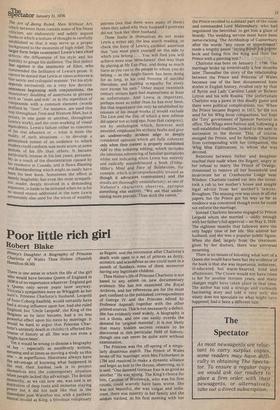Poor little rich girl
Robert Blake
Prinny's Daughter A Biography of Princess Charlotte of Wales Thea Holme (Hamish Hamilton £6.50)
There is one sense in which the life of the girl Who Would have become Queen of England in 1830 is of no importance whatever: England got aQueen only seven years later anyway. Victoria's sympathies were as Whiggish as her aunt's. Princess Charlotte's husband, Leopold of Saxe-Coburg-Saalfeld, would certainly have had a strong influence upon her, had she ruled England; but 'Uncle Leopold', the King of the aelgians as he later became, had a no less Powerful effect upon his niece by marriage. It Would be hard to argue that Princess Charlotte's untimely death in childbirth affected the Fourse of history at all. She was not even a Might-have-been'.
Yet it would be wrong to dismiss a biography of her — especially as excellently written, amusing and at times as moving a study as this °ne — as superfluous. Historians always have the advantage of knowing what happened in the end; their hardest task is to project themselves into the contemporary situation When people lacked this advantage. The British Monarchy, as we can now see, was and is an institution of deep roots and immense staying Power but it did not look like that in the "mediate' post-Waterloo era, with a pathetic Mental invalid as King, a frivolous voluptuary
as Regent, and the succession after Charlotte's death wide open to a set of princes as dotty, eccentric and scandalous as one could meet in a month of Sundays, none of them moreover having any legitimate children. Thea Holme's life of Princess Charlotte is not based to any extent on new documentary evidence. She has not examined the Royal Archives, and her references are for the most part confined to the published correspondence of George IV and the Princess edited by Professor Aspinall, together with the other printed sources. This is not necessarily a defect. She has evidently read widely. A biography is not a thesis, and one can easily overdo the demand for 'original material'. It is not likely that many hidden secrets remain to be discovered in this particular field of history, though one can never be quite sure without examination.
The Princess was the off-spring of a singularly disastrous match. The Prince of Wales broke off his 'marriage' with Mrs Fitzherbert in 1794 and resolved to make a dynastic alliance and beget an heir to the throne, observing, so it is said: "One damned German frau is as good as another." He was wrong. The King's choice for him, Caroline of Brunswick, who was his first cousin, could scarcely have been worse. She was not beautiful, she was vulgar and indiscreet, there was insanity in her family and she seldom washed. At his first meeting with her


























 Previous page
Previous page